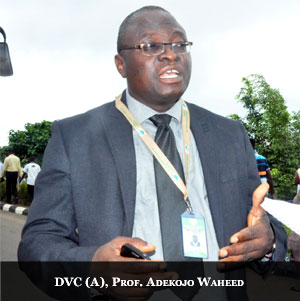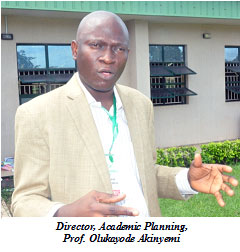
The Deputy Vice-Chancellor (Academic), Professor Adekojo Waheed, has described graduates of FUNAAB as high fliers, who compete excellently with their counterparts from other leading institutions. Professor Waheed, while disclosing this recently, noted that in spite of the fact that the University had produced many First Class graduates, many of such graduates prefer not to be retained in the University, because of the extant rule that states that a staff must have worked for one year before being eligible for Study Leave with Pay, adding that these students would rather opt for postgraduate studies abroad. He disclosed that this trend was not good for the system, because such high fliers are unable to contribute their quota to national development.

The Deputy Vice-Chancellor (Academic) disclosed that in order to address this challenge, the University Senate had introduced competition to the employment process, such that persons with genuine passion for work are made to take up employment. ”When we throw it open, you can just come back as soon as you finish. Some of them may not be interested. Maybe they have not gotten a job and they feel this is a cheap job for me. Let me just go there and start. They would not be committed”. He added that the present position was that, “if you are interested, you apply. When you apply, then we consider you. But it would now be through some conditions. It is not every First Class graduate that is interested in academics, so the interview would bring that out”. He noted that the essence was to read the students’ mind and to know whether they actually have the vision and plans to go into academics. “We want to know whether if you are sent out to study, you will focus on your PhD programme and come back to the country”, he stressed. According to him, “There are so many of them who have travelled out of this county and refused to come back. We want to know if what we are investing on, is really worth it”. Responding to whether there is a policy statement in place on automatic employment for First Class graduates, he said the statement was enacted, to encourage students to work hard to become First Class graduates such that when they graduate, there could be a window of opportunity for automatic employment. However, he added that the University had been encouraging its First Class graduates intellectually, through proper supervision of their postgraduate studies abroad.
Professor Waheed described employment in the University system as being budget-based, adding that no public University could just employ staff without ensuring that the money is there to pay salaries. “It cannot be automatic, but where there are vacancies, people who apply would be considered.” Re-iterating the importance of employing First Class graduates in the University, he said that a system that does not think of how it would sustain itself would not stand the test of time, noting that the University once created a programme named Junior Research Fellow (JRF) for its First Class graduates, but this was later abolished by the Senate to give way to the Graduate Assistantship programme, which was well-known to all Nigerian Universities.
In a separate chat, the University’s Director of Academic Planning, Professor Olukayode Akinyemi, had stated that First Class graduates do not have problems securing jobs in general, adding that most of them are not usually interested in getting jobs immediately, but would rather prefer to further their education.
According to him, “If someone graduates with a First Class, seven out of 10 of such are not interested in getting a job immediately. They would want to go for their Masters and PhDs. Preferably, they would like to get scholarships to fly-out of the country”. Professor Akinyemi said that Graduate Assistants were relatively employed in the University system once in two years, depending on the existing vacancies as Graduate Assistants were required to have Masters Degrees before being appointed as Assistant Lecturers. He added that if two students emerged in a Department as First Class graduates, both as male and female students, preference is always given to the female student in line with the decision of the University Senate.
Shedding more light on the replacement of the Junior Research Fellow, with the Graduate Assistantship, he said the latter was a statutory starting cadre in academics while JRF was not. He noted further that the Graduate Assistantship programme, the cadre was a creation of the Senate to help bring First Class graduates into the system. He added that the only difference was that it was not only open to First Class graduates, even though those with Second Class (Upper Division) degree could also apply, as they would all be subjected to interviews. According to him, “The wisdom of the Senate was that, it is better we make it competitive in the sense that let First Class graduates also compete with somebody that has a very good 2.1. Because Senate also observed that there are some instances where First Class graduates compete with 2.1 and even lower and the 2.1 did better that the First Class. So, the idea was to make it competitive”.
Professor Akinyemi stated that there was no law, which stipulated that each University must retain its First Class graduates, saying that Universities that indulged in the practice was doing so in order to encourage young and brilliant graduates to go into academics. As the “older Academics are graduating, the younger ones are taking over and the younger ones that must take their place and must be people who are operating at that First Class level”. He mentioned other schemes put in place by the University in assisting such graduates, like the Graduate Farming Employment Scheme (GRADFES), that had been supporting graduates to go back into farming, adding that the sum of between N200,000 and N300,000 were given to beneficiaries as loans by the University and repayable over a period of two years to start-up while their certificates were used as collateral. In addition, the Presidential Special Scholarship Scheme for Innovation and Development (PRESSID), which is co-ordinated by the NUC, had also assisted the First Class graduates to actualise their dreams of travelling abroad for their Masters and PhDs and that other available opportunities include the Commonwealth Scholarships, Professor Akinyemi added.
